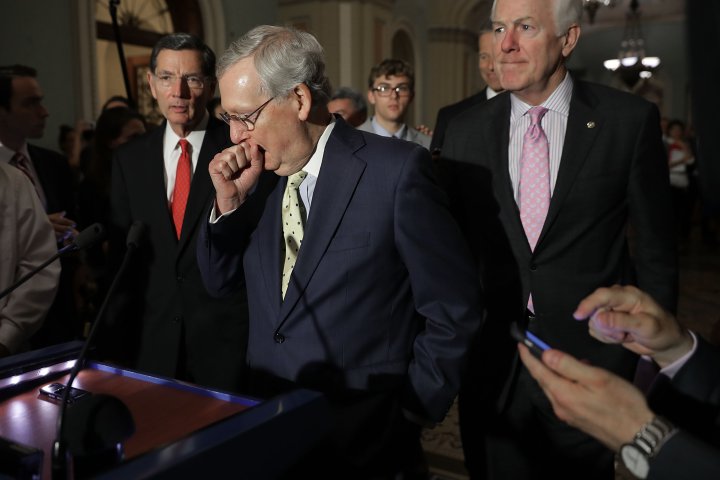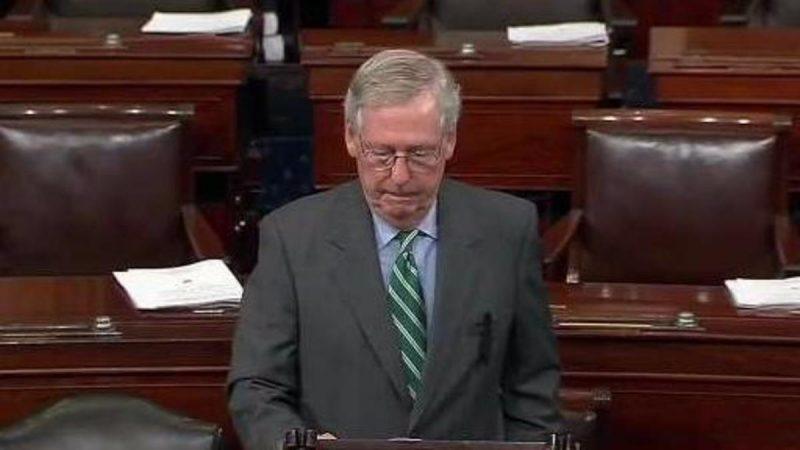
It would be nice to think that Republicans finally got a conscience (or any politicians for that matter) and stepped back from voting Mitch McConnell’s TrumpCare bill through. Sadly, the party that made some huge promises weren’t even willing to listen to their voters.
McConnell tried pushing this through to get to tax reform, which only shows how bad things have gotten in Washington D.C. Once again, voters are forgotten, and it’s all about the ego and trying to get something, anything passed. It didn’t seem to matter that only 17 percent of voters supported the bill.
With mid-term elections looming large, Republicans know it’s ‘do or die’ time, but we can be thankful that enough Republicans knew that this health care bill to repeal Obamacare was just plain bad.
Some were more concerned about losing their seat in 2018, but at least that stopped them from passing something that would have such a negative affect on all Americans. Many may say that they wouldn’t be affected, but with this bill, hospitals would have been forced to close down wings, units or just their doors entirely.
So now, they say that the bill vote is being delayed until after the holiday weekend, but after Senators hear their constituents back home, it’s likely to remain in limbo.
The Republican Party’s long-promised repeal of “Obamacare” stands in limbo after Senate GOP leaders, short of support, abruptly shelved a vote on legislation to fulfill the promise.
The surprise development leaves the legislation’s fate uncertain while raising new doubts about whether President Donald Trump will ever make good on his many promises to erase his predecessor’s signature legislative achievement.
Senate Republican leader Mitch McConnell announced the delay Tuesday after it became clear the votes weren’t there to advance the legislation past key procedural hurdles. Trump immediately invited Senate Republicans to the White House, but the message he delivered to them before reporters were ushered out of the room was not entirely hopeful.
“This will be great if we get it done, and if we don’t get it done it’s just going to be something that we’re not going to like, and that’s OK, and I understand that very well,” he told the senators, who surrounded him at tables arranged in a giant square in the East Room. Most wore grim expressions.
In the private meeting that followed, said Sen. Marco Rubio of Florida, the president spoke of “the costs of failure, what it would mean to not get it done – the view that we would wind up in a situation where the markets will collapse, and Republicans will be blamed for it and then potentially have to fight off an effort to expand to single payer at some point.”
The bill has many critics and few outspoken fans on Capitol Hill, and prospects for changing that are uncertain. McConnell promised to revisit the legislation after Congress’ July 4 recess.
“It’s a big complicated subject, we’ve got a lot of discussions going on, and we’re still optimistic we’re going to get there,” the Kentucky lawmaker said.
But adjustments to placate conservatives, who want the legislation to be more stringent, only push away moderates who think its current limits – on Medicaid for example – are too strong.
In the folksy analysis of John Cornyn of Texas, the Senate GOP vote-counter: “Every time you get one bullfrog in the wheelbarrow, another one jumps out.”
McConnell can lose only two senators from his 52-member caucus and still pass the bill, with Vice President Mike Pence to cast a tie-breaking vote. Democrats are opposed, as are most medical groups and the AARP, though the U.S. Chamber of Commerce supports the bill.
A number of GOP governors oppose the legislation, especially in states that have expanded the Medicaid program for the poor under former President Barack Obama‘s Affordable Care Act. Opposition from Nevada’s popular Republican Gov. Brian Sandoval helped push GOP Sen. Dean Heller, who is vulnerable in next year’s midterms, to denounce the legislation last Friday; Ohio’s Republican Gov. John Kasich held an event at the National Press Club Tuesday to criticize it.
The House went through its own struggles with its version of the bill, pulling it from the floor short of votes before reviving it and narrowly passing it in May. So it’s quite possible that the Senate Republicans can rise from this week’s setback.
But McConnell is finding it difficult to satisfy demands from his diverse caucus. Conservatives like Rand Paul of Kentucky and Mike Lee of Utah argue that the legislation doesn’t go far enough in repealing Obamacare. But moderates like Heller and Susan Collins of Maine criticize the bill as overly punitive in throwing people off insurance roles and limiting benefits paid by Medicaid, which has become the nation’s biggest health care program, covering nursing home care for seniors as well as care for many poor Americans.
GOP defections increased after the Congressional Budget Office said Monday the measure would leave 22 million more people uninsured by 2026 than Obama’s 2010 statute. McConnell told senators he wanted them to agree to a final version of the bill before the end of this week so they could seek a new analysis by the budget office. He said that would give lawmakers time to finish when they return to the Capitol for a three-week stretch in July before Congress’ summer break.
The 22 million extra uninsured Americans are just 1 million fewer than the number the budget office estimated would become uninsured under the House version. Trump has called the House bill “mean” and prodded senators to produce a package with more “heart.”
The Senate plan would end the tax penalty the law imposes on people who don’t buy insurance, in effect erasing Obama’s so-called individual mandate, and on larger businesses that don’t offer coverage to workers.
It would cut Medicaid, which provides health insurance to over 70 million poor and disabled people, by $772 billion through 2026 by capping its overall spending and phasing out Obama’s expansion of the program.


